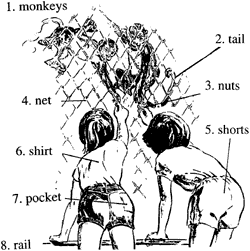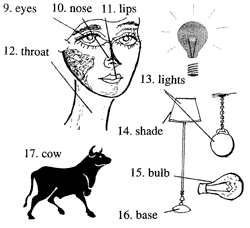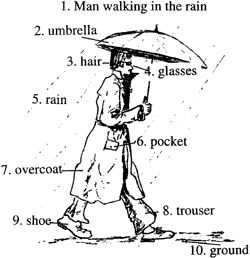Unit 14: Relative Pronouns
相关代名词
Pictured Words
图片字

| 1. monkeys
1.猴子 |
| 2. tail
2.尾部 |
| 3. nuts
3.坚果 |
| 4. net
4.网 |
| 5. shorts
5.短裤 |
| 6. shirt
6.衬衫 |
| 7. pocket
7.口袋 |
| 8. rail
8.责骂 |

| 9. eyes
9.眼睛 |
| 10. nose
10. 鼻子 |
| 11. lips
11.嘴唇 |
| 12. throat
12.咽喉 |
| 13. lights
13.光亮 |
| 14. shade
14.荫 |
| 15. bulb
15.球茎 |
| 16. base
16.基本 |
| 17. cow
17.母牛 |
New Words
新字
Nouns
名词
覆盖
测量
天空
天气
母牛
位置
声
风
灰尘
沙
转
外观
大小
方法
Adjectives
形容词
黑 - 白
微弱的 - 有力地
圆
急速
普通
充满的
就绪
奇怪的
复合体 - 简单
绿色 - 蓝
弱的
Sayings
语录
With whom are the boy and girl playing?
同谁一起男孩是和女孩播放?
Whose nuts seem better to the children?
谁坚果好似比较好对孩子吗?
Why should they do this to them?
为什么将他们做这他们?
Who is lovely?
谁是惹人喜爱地?
We take pleasure in those whose eyes are full and round.
我们乐于那些谁的眼睛充满的和圆.
Turn the light on, please.
转偶然遇见,请.
What will make the room bright?
什么将制作房间明亮?
Whoever does it will seem strange.
任何人它将似乎奇怪的.
Relative Pronouns
相关代名词
In this story we see some examples of these pronouns:
在这故事我们看见一些例子的这些代名词:
Who is greatest in the kingdom of heaven?
谁是最伟大的在天堂的王国 ?
whoever then will make himself as low as this little child
任何人然后将制作他自己和这一样低小孩子
whoever is a cause of trouble to one of these little ones
任何人是原因的麻烦这些之一小东西
who have faith in me
谁有信任在我
There other relative pronouns like "who" and "they" may best be put in a Table:
在那里其他亲戚代名词喜欢谁和他们可以最好放在表格:
Relative Pronouns can be singular or plural
| WHO
谁 | form for subject - "persons"
形成为主题- "人" |
| WHO(M)*
谁 | form for object
形成为对象 |
| WHOSE
谁 | form for possessive adjective
形成为所有格形容词 |
| WHICH
哪些 | form for subject or object - "things"
形成为主题或反对- "事" |
| WHAT
什么 | form for subject or object - "that which"
形成为主题或反对- "那" |
*whom is not usual in talking and writing.
*在通常在讲和笔迹谁 .
These words take the place of a noun or pronoun that has already been said and so they are called relative pronouns: they relate to those other "things".
这些字代替名词或代名词那已据说和如此他们被称为相关代名词:他们涉及那些其他 "东西".
They are used in a statement to give extra knowledge of what is talked about in it.
他们是使用在陈述给额外的知识的什么被讨论在它.
A relative pronoun may be the subject or the object of the statement, but it always comes at its start.
相关代名词可以是主题或陈述的对象,但是它总是达到它的开始.
"Who" is used for persons and "which" is used for animals or things.
谁是使用为人们和哪一个是使用为动物或东西.
They may be either singular or plural.
他们可以是或者单一的或者复数.
If the statement does not need to say something about a previous noun or pronoun, "who" or "which" may have the words "this" or "those" before them:
如果陈述不需要说东西有关前一名词或代名词,在他们前谁或哪一个可有字这或那些 :
those who go to her do not come back again
那些谁到她不回来再次
those who have given me their love are loved by me
那些谁已我宁愿要他们的爱被爱由我
those who had taken us prisoner made request for a song
那些谁已拿我们囚犯制作要求非常便宜地
those who had taken away all that we had gave us orders
那些谁已拿走所有那我们已给我们顺序
If these statements had been for one person "this" would have been used in place of "those".
如果这些陈述已经举例说人这将已经使用取代那些.
The possessive adjective "whose", may be used for both persons and things.
所有格形容词谁的,可以是使用为两者人们等等.
Like the other relative forms it is put before the statement and the noun it is referring to comes after it, whether that noun is the subject or the object:
在陈述前喜欢另一个相关窗体它放和名词它是参考跟在它后面,无论那名词是主题或对象:
those whose words are false
那些谁的字错误
those whose acts are false
那些谁的行为错误
he whose heart is glad has an unending feast .
他谁的心喜欢的有不停的宴会 .
he whose ways are upright will go safely.
他谁的方法正直的将去安全地.
those whose acts are true are his delight
那些谁的行为真实的是他的愉悦
The other word in our Table is "what".
另一个字在我们的表格是什么.
It has the sense of "that which":
它有感觉的那哪一个:
I will say what I have.
当然什么我有.
who is able to keep from saying what is in his mind?
谁能抑制话是在他的头脑?
I will not say what is false to your face.
我不会说错误是什么坦白地.
"What" may also be used when a question is asked:
什么可以也是使用当一个问题被问:
what am I to give you?
我是什么给你?
what is the upright man to do?
什么是正直的人做?
what is man?
人是什么?
what is it to him?
它是什麽他?
what were all those herds which I saw on the way?
什么是所有那些兽群我看见哪一个在途中?

| 1. man walking in the rain
1. 人进入雨 |
| 2. umbrella
2. 伞 |
| 3. hair
3. 头发 |
| 4. glasses
4. 杯子 |
| 5. rain
5. 雨 |
| 6. pocket
6. 口袋 |
| 7. overcoat
7. 外套大衣 |
| 8. trousers
8. 裤子 |
| 9. shoe
9. 鞋 |
| 10. ground
10. 地面 |
A Great Rain
伟大的雨
Then Elijah said to Ahab, Up!
然后以利亚说到 Ahab,向上!
take food and drink;
拿食物和喝;
for there is a sound of much rain.
为有许多雨的声音 .
So Ahab went up to have food and drink, while Elijah went up to the top of Carmel;
如此-以色列之王去有食物和喝,一会儿以利亚去 Carmel的顶 ;
and he went down on the earth, putting his face between his knees.
并且他在地球上下降,击球入洞他的脸位于他的膝盖.
And he said to his servant, Go now, and take a look in the direction of the sea.
并且他说到他的仆人,去现在,并且看看在海方.
And he went up, and after looking said, There is nothing.
并且他上涨,并且后于神色说,有没有.
And he said, Go again seven times;
并且他说,去再次七次;
and he went seven times.
并且他去七次.
And the seventh time he said, I see a cloud coming up out of the sea, as small as a man's hand.
并且第七时间他说,明白了云走近缺乏海,和一个人的手一样小 .
Then he said, Go up and say to Ahab, Get your carriage ready and go down or the rain will keep you back.
然后他说,上涨和说到Ahab,将你的托架准备好和下降或雨将阻止你.
And after a very little time, the heaven became black with clouds and wind, and there was a great rain.
并且后于非常小时间,天堂变成黑和云和风,并且有伟大的雨.
And Ahab went in his carriage to Jezreel.
并且 Ahab开始他的托架到 Jezreel.
And the hand of the Lord was on Elijah;
并且手的进行勋爵以利亚;
and he made himself strong, and went running before Ahab till they came to Jezreel.
并且他制作他自己有力地,在以色列之王前并且去运行直到他们来到 Jezreel.
Additional Reading
附加读
In the country where Elijah was living the weather is of special interest.
在乡下在哪里以利亚在过着天气是的特殊兴趣.
It is quite common to have rain clouds go across the whole sky in a very short time.
它相当普通有雨云横过去全部天空在非常短的时间.
They seem to come up from the sea as a little bit of cloud which is of no size at all in that great stretch of blue sky.
他们似乎走近从海作为稍的云是的不大小根本在那伟大的弹性伸缩的蓝天空.
But it becomes rain in a very short time.
但是它变成雨在非常短的时间.
It seems only a few minutes.
它似乎一点点的分钟.
People who are living under those weather conditions will make for some kind of cover so soon as they see such a cloud starting to come into the sky.
人在过着在下面那些天气条件将拥护一些很快有点儿覆盖如此作为他们看见这样一种云开始进入天空.
This is the sort of weather that is named Mediterranean by the experts.
这是那种天气那被名字地中海由专家.
But do not put that word in your memory just yet.
但是不把那字放入你的存储器恰好现在.
The point about this story is that there had been no rain for more than three years.
点关于这故事是那有没下雨为超过三年.
It seems strange to us that Elijah knew when it would rain.
它似乎奇怪的我们那以利亚知道它将当下雨.
He went up to the top of the mountain above the sea to get ready for the coming of the rain, and he sent word to Ahab.
他去山的顶在海上方准备好出身于雨,并且他带口信到 Ahab.
He even sent his servant to keep watch for its coming.
他仆人甚至送他的守候它的来.
He was told by God that this rain would come.
他被告诉的的确确那这下雨将来.
It put Elijah in a very important position in his relation with Ahab to be able to say to him, before it came about, that the rain would come and be so destructive that he would need to get away to a safe place.
它把以利亚放入非常重要的位置在他的关系和 Ahab能说他,在它发生前,那雨将来和是如此毁灭性的以致他将需要离开安全放置.
And this is what Ahab did.
并且这是什么 Ahab.
There are many pictures of the prophet Elijah running before Ahab's carriage through the driving rain, with his hair flying behind him and the light of purpose on his face.
在以色列之王前有穆罕默德的许多图像以利亚运行的托架通过驱动下雨,和他的头发飞行在他后面和光亮有意地在他的脸.
He got his full measure of effect on Ahab and sent him the word that God was in control of all his designs.
他获得他的充满的测量的对Ahab和送他字那上帝是控制住所有他的设计.
Helpful Notes
有用的笔记
| keep watch
看守 | having one's eyes open.
有一的眼睛打开. |
| knees
膝盖 | part of the legs of the body.
腿的部分的体. |
| relation
关系 | in hand with.
在手头和. |
| carriage
托架 | a thing for taking a ride.
东西为取得骑. |
| picture
图片 | a story without talking.
故事没有多嘴的. |
| clouds
云 | soft bodies in the sky above us.
软体在空中在我们上方 . |
| mountain
山 | a very high place.
非常高放置. |